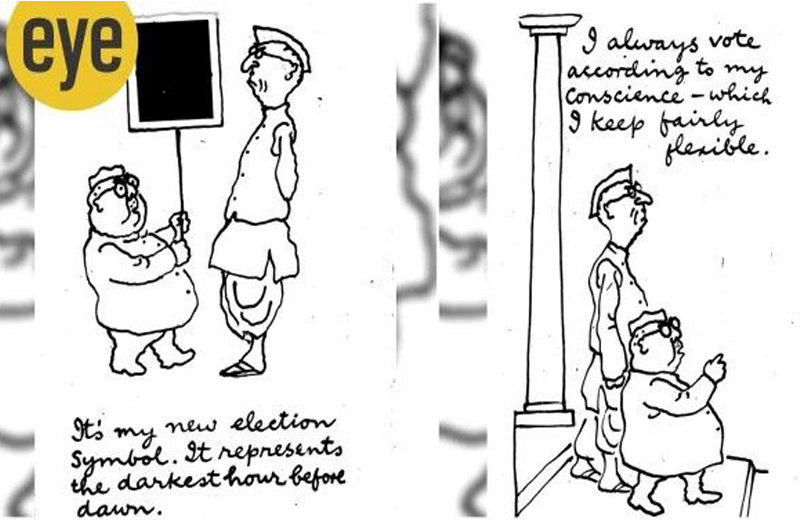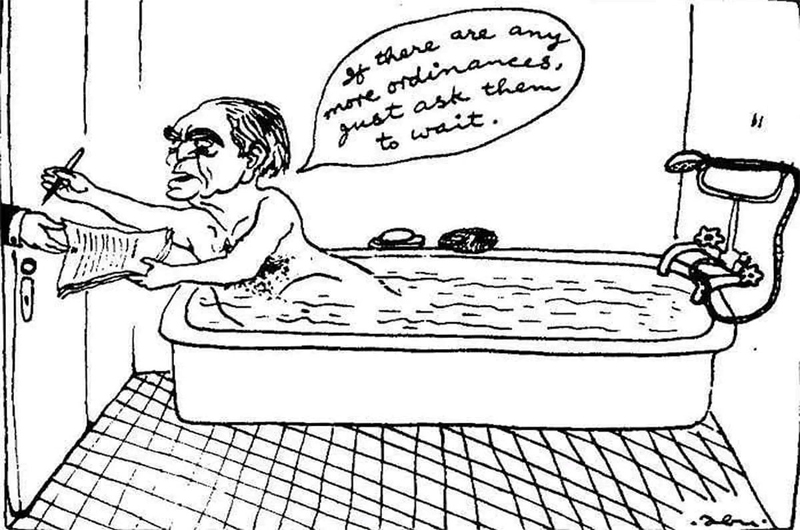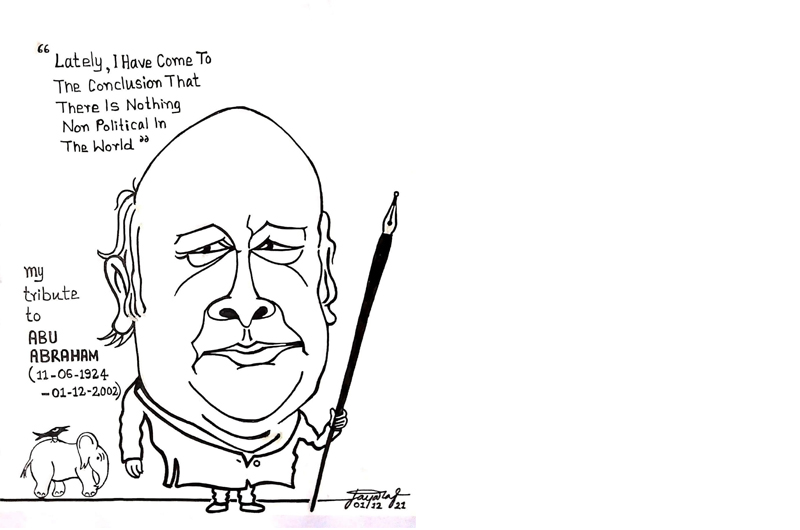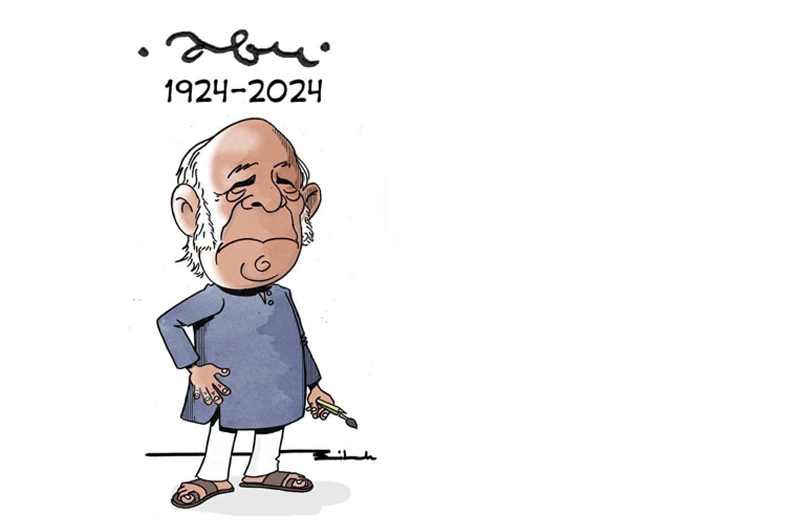Attupurathu Mathew Abraham, popularly known as Abu Abraham, one of the finest political cartoonists that India has produced, would have been 100 on 11 June 2024. He drew cartoons for more than four decades in different publications in Britain and in India, lampooning the high and mighty and chronicling one of the most tumultuous times in history. Here’s a centenary tribute by Prof Mrinal Chatterjee
Born in Tiruvalla, Kerala, to A.M. Mathew and Kantamma, on June 11, 1924, Attupurathu Mathew Abraham, popularly known as Abu, started drawing cartoons at the age of three. After his stint at the University College, Thiruvananthapuram (Trivandrum), taking up French, Mathematics and English, and leaving a mark as tennis champion, he moved to Bombay to work as journalist.
Starting off as Abraham (the name ‘Abu’ got added only later), here is his interesting story. As Abu writes in his reminiscences: “In April 1956, something happened which changed my life radically. Michael Foot had published two of my political cartoons in his weekly journal, Tribune (founded by Aneurin Bevan). Two days after the second cartoon appeared, I had a letter from David Astor, editor of the The Observer, which simply said: “I am very much interested in the work you have been doing and I would like to know if you could care to do some drawings for the Observer.” As suggested in the letter, I phoned Astor’s secretary and went to see him two days later. To my astonishment, I found that Astor had made up his mind to take me on his staff… my first cartoon was produced in the first week of April, 1956. I had signed it Abraham as I had done for about ten years… David Astor, after approving the cartoon said: Can’t you find a pseudonym? He explained, saying that any Abraham in Europe would be taken as a Jew and all my cartoons would take on a slant for no reason, and I wasn’t even Jewish. What was more, the Middle-East was beginning to boil at that time with Nasser dominating the scene. I thought up the pseudonym, Abu. ‘Perfect’, Astor said, suitably mysterious. Thus was I re-christened on that morning, Friday, April 6, 1956.”

Abu had began his professional career in 1946 with The Bombay Chronicle as reporter, and its sister publication, The Bombay Sentinel. He drew cartoons for them and also for Blitz and Bharat as a freelancer. In 1951, he was invited by Shankar (1902-1989), one of India’s best known cartoonists, to move to New Delhi to work for Shankar’s Weekly. Abu accepted the offer and started working in there. In 1953, he met Fred Joss of the London Star, who encouraged him to move to London. Abu, a heady 32 at the time, arrived in London in the summer of 1953 and immediately could sell cartoons to Punch magazine and the Daily Sketch and contribute material to Everybodys’ London Opinion and Eastern World under the pen name ‘Abraham’.
In September 1966, Abu joined The Guardian followed by a weekly cartoon in the Tribune. He worked with The Guardian for three years (1966-69). He edited Verdicts on Vietnam, a collection of anti-war cartoons on Vietnam. He returned to India in 1969 with his first wife Sarojini and two daughters, Aysha and Janaki, to work as editorial cartoonist for the Indian Express. From 1972 to 1978, came a stint in the Rajya Sabha. The Emergency (1975-1977) brought out the best in him, and he drew scathing cartoons.
Believing that India’s democracy and its base of tolerance allowed for editorial cartoonists like himself to thrive, Abu devoted the last three decades of his life to keeping politicians on their toes, offering at least one cartoon per day. As Sadanand Menon, an arts editor, wrote, “His (Abu’s) unique minimalist style, coupled with acerbic wit and astute political analysis, make him as relevant today as during the decades in which he lived and worked.” Abu’s work during the Emergency period was later published as a book, Games of Emergency. His other books were Abu on Bangladesh (1972), Private View (1974), and Arrivals and Departures (1983). His animated film called No Arks won a British Film Institute Special Award in 1970.
Abu left The Indian Express in 1981 and began to syndicate his work to half a dozen newspapers. That year, he also started his strip cartoon, Salt and Pepper, which ran for nearly 20 years in various publications. Abu edited the Penguin Book of Indian Cartoons (1988). In 1988, he moved to Trivandrum with his second wife, British-born Psyche, lived in their home, Saranam,and worked from there. He was a lifelong atheist (like Psyche) and a rationalist, a philosophy many of cartoons and cartoon strips reflect.

Abu passed away on December 1, 2002. His cartoons have always been simple with no-fuss lines, with a subtle sense of humour and provocation. Journalist Humra Quraishi writes about another aspect of his cartoons: “they seem ageless—the ones he drew during the Emergency hold out and hit you even now. So whilst he’s been laid to rest, his cartoons are there to go on provoking you to think on.”
Cartoonist Sudhir Tailang made a film on Abu in 2003. Titled Abu, The Philosopher,it revolves around the twists and turns in Abu Abraham’s life. What made Abu Abraham a great political cartoonist was his all consuming passion for politics. He had once written: “Lately, I have come to the conclusion that there is nothing non-political in the world.”

(The writer, a journalist-turned-media academician, is regional director of the Eastern India campus of the Indian Institute of Mass Communication in Dhenkanal, Odisha. Besides focusing on media and communication, he writes fiction and columns in English and Odia.)



 from Webdoux
from Webdoux